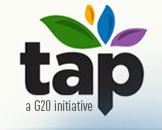Weak and outdated Institutions are a major challenge to agricultural innovation and research. GFAR aims to strengthen institutional capacities, to align them with national and regional policy frameworks and to close the capacity “gaps” that constrain agricultural innovation systems in developing countries.
 The Tropical Agricultural Platform (TAP) is focused on more effective and streamlined capacity development in innovation systems in tropical agriculture. By helping to bridge the capacity gap, TAP aims to pave the way for agricultural innovations that meet the demands of its principal users - small farmers, small and medium-sized agribusinesses and consumers. TAP was created to focus specifically on the Least Developed Countries (LDCs), more than 90% of which are located at least partly within the Tropics.
The Tropical Agricultural Platform (TAP) is focused on more effective and streamlined capacity development in innovation systems in tropical agriculture. By helping to bridge the capacity gap, TAP aims to pave the way for agricultural innovations that meet the demands of its principal users - small farmers, small and medium-sized agribusinesses and consumers. TAP was created to focus specifically on the Least Developed Countries (LDCs), more than 90% of which are located at least partly within the Tropics.
TAP was launched at the first G20-led Meeting of Agriculture Chief Scientists (MACS) in September 2012, and was also endorsed by the G8 leadership. GFAR provided support to the first meeting of the TAP Steering Committee.
TAP provides the means to exchange ideas, knowledge, experiences, and practices, and to work in a more coordinated way. The Platform now includes more than 40 partners, many of whom are Partners in GFAR, which include national agricultural research, education and extension institutions as well as civil society actors, farmers’ organizations and key regional and international fora, networks and agencies. The approach used by TAP acknowledges national leadership ownership and is aligned with national plans and demands. The result is more coherent development solutions at scale with lower transaction costs. TAP also works closely with other multi-partner initiatives that promote coherent institutional approaches, such as those by Regional Fora and international agencies.
TAP is built on the same principles of GFAR Collective Actions: TAP programs are initiated together by multistakeholder partners on the basis of an open, inclusive and transparent process. The first such task was to consolidate the different existing approaches to agricultural innovation. Therefore, in 2015 the development of a Common Framework on Capacity Development (CD) for Agricultural Innovation Systems (AIS) was undertaken, for which GFAR provided support. Concepts and principles of the TAP Common Framework are being tested in eight countries in Africa (Angola, Burkina Faso, Ethiopia, Rwanda), Asia (Bangladesh, Laos) and Central America (Guatemala, Honduras), as part of the CDAIS initiative.
Resources for Capacity Development
GFAR has supported TAP to provide resources to the “innovation facilitators” who link actors to information sources and knowledge in the eight focus countries for CDAIS. Their role is also to create trust among actors involved in the learning process and support them in tracking and reflecting on the process of developing their capacity to innovate.
GFAR funded the publishing of the TAP Common Framework in 8 languages for use in the countries where CDAIS is being carried out.
Download the TAP Common Framework here
TAPipedia is an information sharing system designed to enhance knowledge exchange in support of CDAIS, hosted and maintained by GFAR Secretariat. TAPipedia aims to be a global information system for good Capacity Development practices, innovation outputs, success stories and lesson learned.
TAPipedia allows TAP partners and other stakeholders to share their own applied and context specific CDAIS resources and to discover such knowledge from different sources, partners and regions. TAPipedia also assists TAP members to present, explain and promote the Common Framework, so that it may be more easily tested, improved, adopted and implemented by stakeholders.
Since 2015, GFAR Secretariat has organized high quality, thought-provoking webinars based on the needs and requests of the Partners in GFAR. GFAR Secretariat offers support in convening presenters from within the GFAR network and by helping to set a broader frame and eliciting thought-provoking angles to address the topic in question. In addition to receiving this in-house expertise in crafting a webinar that draws ample interest, Partners also benefit from technical support in running the actual webinar.
GFAR-TAP webinars to date have included:
“Agents of change – the role of innovation facilitators”
“Sharing Knowledge on Capacity Development for Agricultural Innovation through TAPipedia”
We encourage Partners in GFAR that have not yet joined TAP to do so,
and similarly TAP partners to register themselves as Partners in GFAR.
Partners in GFAR, become TAP partners:
http://www.tapipedia.org/user/registerTAP partners, become Partners in GFAR:
http://www.gfar.net/about-us/be-a-partner
